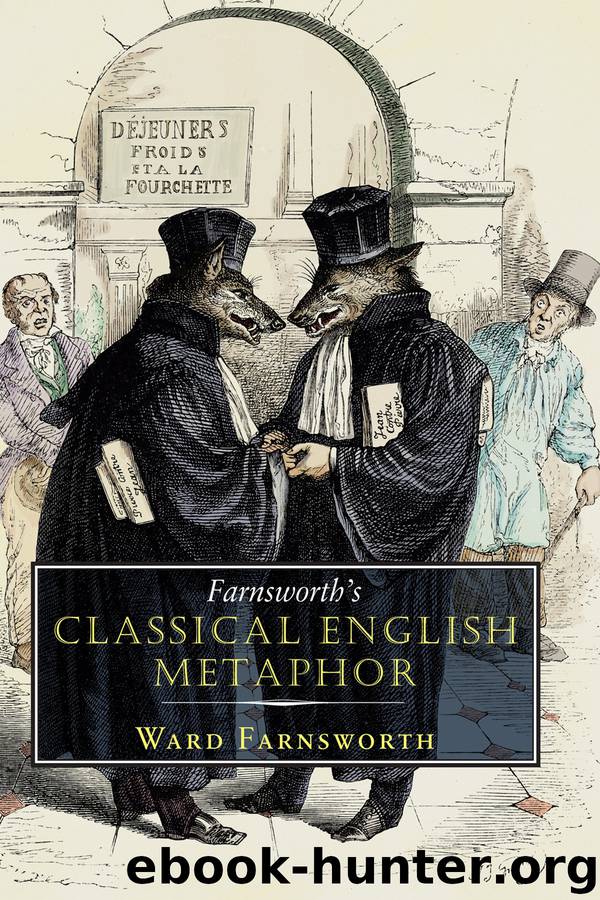Farnsworth's Classical English Metaphor by Ward Farnsworth

Author:Ward Farnsworth
Language: eng
Format: mobi
Publisher: David R. Godine, Publisher
Published: 2016-08-15T00:00:00+00:00
Chapter Eight
OCCUPATIONS & INSTITUTIONS
When one wants to describe human behavior, the most common source of comparative material is found in other human behavior. Typically the behavior described is specific and less striking by itself; the behavior borrowed – the source of the comparison – is familiar to the imagination and more extreme, and serves as a caricature of the subject. We saw examples in the previous chapter in which the source of the comparison was a distinctive sort of person from the edges of ordinary humanity: a child or a lunatic or a drunk, each of whom might be considered a caricature of the ordinary man or woman. The same idea may be extended to cases in which the extremity lies not in the inherent limitations or inner condition of the people borrowed – not in their lunacy or drunkenness – but in what the people in the comparisons do: their occupations.
Chesterton, Tolstoy and the Cult of Simplicity (1903)
Thousands of modern men move quietly and conventionally among their fellows while holding views of national limitation or landed property that would have made Voltaire shudder like a nun listening to blasphemies.
Nuns stand about as far from conventional experience as drunks, at least when put to use in a simile. (Let us not confuse that usage with reality; we won’t pause to consider whether nuns shudder at blasphemies in fact.) They therefore make valuable points of reference for comparisons meant to exaggerate. Many other occupations have features that make them distinctive in analogous ways. Thus lawyers or doctors may not amount to types as extreme as nuns in the popular imagination, but aspects of their work likewise epitomize elements of human experience and so provide grist for metaphor.
In this chapter we also will consider a related type of source material: institutions, such as kingdoms or other governments, that can give comparative form to subjects more modest in scale.
1. Lawyers. As the unhappy epitomizers of insincerity and related unsavory qualities:
Emerson, Self-Reliance (1841)
I hear a preacher announce for his text and topic the expediency of one of the institutions of his church. Do I not know that he is pledged to himself not to look but at one side, the permitted side, not as a man, but as a parish minister? He is a retained attorney, and these airs of the bench are the emptiest affectation.
Chapman, Robert Browning (1898)
He was not a thinker, for he was never in doubt. He had recourse to disputation as a means of inculcating truth, but he used it like a lawyer arguing a case. His conclusions are fixed from the start.
Wilde, A New Calendar (1887)
He admits himself that it was at the special request of the compiler of the Calendar that he wrote the preface at all, and though he courteously adds that the task is agreeable to him, still he shows only too clearly that he considers it a task and, like a clever lawyer or a popular clergyman, tries to atone for his lack of sincerity by a pleasing over-emphasis.
Download
This site does not store any files on its server. We only index and link to content provided by other sites. Please contact the content providers to delete copyright contents if any and email us, we'll remove relevant links or contents immediately.
Cecilia; Or, Memoirs of an Heiress — Volume 1 by Fanny Burney(32527)
Cecilia; Or, Memoirs of an Heiress — Volume 2 by Fanny Burney(31928)
Cecilia; Or, Memoirs of an Heiress — Volume 3 by Fanny Burney(31914)
The Lost Art of Listening by Michael P. Nichols(7475)
Asking the Right Questions: A Guide to Critical Thinking by M. Neil Browne & Stuart M. Keeley(5734)
We Need to Talk by Celeste Headlee(5594)
On Writing A Memoir of the Craft by Stephen King(4909)
Dialogue by Robert McKee(4369)
Pre-Suasion: A Revolutionary Way to Influence and Persuade by Robert Cialdini(4193)
I Have Something to Say: Mastering the Art of Public Speaking in an Age of Disconnection by John Bowe(3864)
Elements of Style 2017 by Richard De A'Morelli(3331)
The Book of Human Emotions by Tiffany Watt Smith(3282)
Fluent Forever: How to Learn Any Language Fast and Never Forget It by Gabriel Wyner(3065)
Name Book, The: Over 10,000 Names--Their Meanings, Origins, and Spiritual Significance by Astoria Dorothy(2962)
Why I Write by George Orwell(2932)
Good Humor, Bad Taste: A Sociology of the Joke by Kuipers Giselinde(2929)
The Art Of Deception by Kevin Mitnick(2780)
The Grammaring Guide to English Grammar with Exercises by Péter Simon(2728)
Ancient Worlds by Michael Scott(2658)
